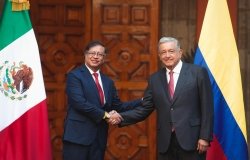Pandemic Politics in the Americas
Americas 360 is a podcast about the “innumerable ties” among the nations of the Western Hemisphere. Get the inside scoop and the outside perspective on the latest developments from Canada, Latin America, and everywhere in between.
How is Brazil handling its explosion of COVID-19 cases? Will discontent in Chile resurface in light of economic pain due to the coronavirus? Our regional experts, including special guest Latin American Program Global Fellow Lucía Dammert, address these topics while our roundtable takes a look at the economic impact of the COVID-19 crisis, how the Americas have responded to the pandemic, and more.
Available on: Spotify; SoundCloud; Apple Podcasts
Listen to more episodes of Americas 360
Duncan Wood
- “The folks in the investment community believe that the [Mexican] government is sending all the wrong signals, so investor confidence has really imploded in the country. A lot of that doesn’t just have to do with the pandemic.”
- "We’ve seen attempts by the [Mexican] government to try to force legislation through Congress to bypass the traditional procedures… Ultimately, it comes down to this question that we’ve all been struggling with, which is how strong are the institutions, are they going to hold up under stress?"
- "North America is strong not because of the similarities between the economies but for the fact that they complement each other in such good fashion."
Christopher Sands
- “The COVID lockdown [in Canada] has actually led to a reduction in the number of protests… What we’ve seen since the lockdown is [that] certain projects such as the Trans Mountain Pipeline have been able to move forward because the protestors are home and being safe."
- "If your healthcare system and your economy has fundamental weaknesses going into a pandemic like this, your negative outcomes are that much more severe and they have the potential to really damage how a country survives."
- Canada has a very good baseline level of care in its public health system but very little surge capacity because the purse strings really belong to Ottawa while delivery is done by the provinces. That’s fine on a day-to-day basis but now we’re finding… a real struggle on the part of provinces to meet that response.
Cynthia Arnson
- “Chile initially… earned a lot of praise for the way that it was implementing testing, but after a gradual easing of the quarantine, the number of cases has just gone through the roof.”
- “[The] pandemic has served as an excuse [and] an opportunity for [President Piñera] to reinforce a number of authoritarian tendencies… He remains very popular and yet he has taken measures [such as] bringing the military physically into the legislature when Congress was not willing to approve a budget proposal on security expenditures. There’s a lot of concern for the future of the rule of law.”
- I think one of the things that this pandemic has shown is that LA is really heterogenous. There are a lot of problems that are common amongst the countries but different countries have different capacities.
Benjamin Gedan
- “In Argentina, you’ve seen polarization decline. You’ve seen a president elected just last October with less than 50% of the vote whose approval rating went as high as 80% in the last few weeks. You’ve seen… the primary figure in the opposition appearing at press conferences with the president and the governor of the province of Buenos Aires, both [of whom are] from the other political party. That’s been unexpected and reassuring.”
- [Something] else we’ve learned is how vulnerable and fragile the gains have been in [Latin America]. Before this pandemic there were a lot of public health challenges that we thought were more or less under control… [N]ow the strains on the health system as it deals with multiple pandemics, multiple public health threats, are quite difficult and we’ll see if there will be backsliding in some of these other battles as resources shift towards COVID-19.
Ricardo Zúñiga
- “Brazil’s situation is complicated by an intense political dispute about how to combat the [COVID-19] epidemic… [T]here’s a split between a president who doesn’t acknowledge the seriousness of COVID-19 as a health crisis and state governors and officials within his own administration that are trying more traditional medical approaches.”
- “The bottom line is that Brazil’s situation is worsening as it heads into its fall season. It’s easy to forget that fall in the southern hemisphere is going to mean a trajectory for countries there.”
- We’re hearing from experts that… the integration between this massive single-payer [healthcare] system and the private sector is vital to [Brazil's] future: that one can’t survive without the other.
Lucia Dammert
- “The economic measures that the [Chilean] government has taken are still weak… We still have more than 3 million people that.. live [off] their earnings every day and the government didn’t follow the actual policies that were needed [sic.]”
- “[My] sense is that the economic crisis, … the lack of legitimacy of this government, [and] the increase [in] discontent that people have with the policies of the government… will spark riots with violence.”
Guests

Cynthia J. Arnson

Lucía Dammert
Professor, Universidad de Santiago de Chile

Benjamin Gedan

Christopher Sands

Duncan Wood

Ricardo Zúniga

Mexico Institute
The Mexico Institute seeks to improve understanding, communication, and cooperation between Mexico and the United States by promoting original research, encouraging public discussion, and proposing policy options for enhancing the bilateral relationship. A binational Advisory Board, chaired by Luis Téllez and Earl Anthony Wayne, oversees the work of the Mexico Institute. Read more

Latin America Program
The Wilson Center’s prestigious Latin America Program provides non-partisan expertise to a broad community of decision makers in the United States and Latin America on critical policy issues facing the Hemisphere. The Program provides insightful and actionable research for policymakers, private sector leaders, journalists, and public intellectuals in the United States and Latin America. To bridge the gap between scholarship and policy action, it fosters new inquiry, sponsors high-level public and private meetings among multiple stakeholders, and explores policy options to improve outcomes for citizens throughout the Americas. Drawing on the Wilson Center’s strength as the nation’s key non-partisan policy forum, the Program serves as a trusted source of analysis and a vital point of contact between the worlds of scholarship and action. Read more

Canada Institute
The mission of the Wilson Center's Canada Institute is to raise the level of knowledge of Canada in the United States, particularly within the Washington, DC policy community. Research projects, initiatives, podcasts, and publications cover contemporary Canada, US-Canadian relations, North American political economy, and Canada's global role as it intersects with US national interests. Read more

Argentina Project
The Argentina Project is the premier institution for policy-relevant research on politics and economics in Argentina. Read more

Brazil Institute
The Brazil Institute—the only country-specific policy institution focused on Brazil in Washington—works to foster understanding of Brazil’s complex reality and to support more consequential relations between Brazilian and US institutions in all sectors. The Brazil Institute plays this role by producing independent research and programs that bridge the gap between scholarship and policy, and by serving as a crossroads for leading policymakers, scholars and private sector representatives who are committed to addressing Brazil’s challenges and opportunities. Read more






